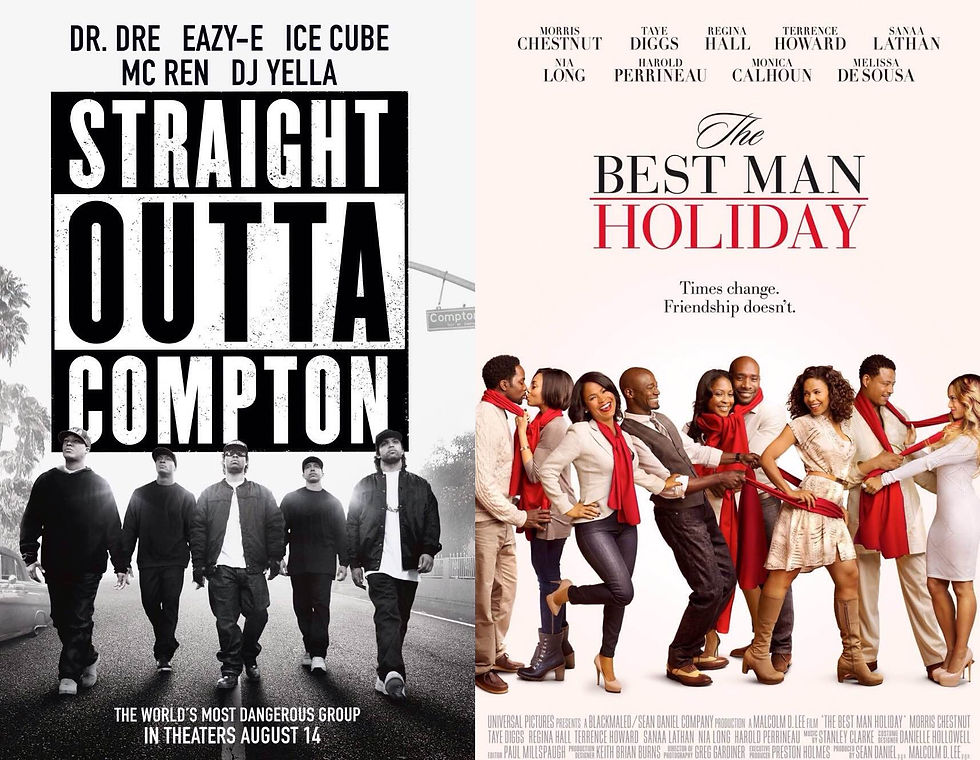Is it time for more Black Films?
- Kamau J. Clark
- Aug 23, 2015
- 4 min read

This year has been an exceptional year for black films. Not one black film has failed at the box office this year all grossing twice as much as their respective budgets. Taking marketing budgets in account as well, all of these films have broken even.
F. Gary Gray's Straight Outta Compton is currently dominating the box office as it enters its second weekend slated to have very little drop off from its opening weekend. The film is arguably one of the best films of this year that has featured several smash hits, proving that black films can be very successful in theaters. This film however isn't the only film to do exceptionally well as others have found success in theaters.
Here's how black films have fared this year so far. For this I am counting films where the lead is black not ensemble films with one black character.
First is the name of the film followed by its budget and then its lifetime gross.
Selma
$20 million
$66.8 million
Dope
700,000
$16.8 million
Wedding Ringer
$23 million
$106.8 million
Focus
$50.1 million
$154 million
Straight Outta Compton
$29 million
$93.1 million (in 2 weeks)
As you can see, black films have fared very well. And so the million dollar question arises. Why don't studios green-light more black films. Some theorize that black films lack international appeal but this theory is somewhat flawed. Ask yourselves...do most films have international appeal? The majority of films that heavily benefit from the international market are blockbuster films. American films already don't cater to Japanese audiences. Most films don't gross very much in the Japanese market, with films featuring Japanese characters commonly being the most successful. Examples of this are Pacific Rim and The Wolverine both grossing more than $10 million respectively. Both films featured prominent Japanese characters in their respective casts.
As a matter of fact, China commonly limits the number of U.S. films that they import per year, usually reserving those spots to major blockbusters or films featuring Chinese actors.

With the majority of films bearing mostly white casts, this theory pretty much implies that whites are the most internationally marketable. But isn't it kind of silly to say that when the majority of people in the world are of other ethnicities? No seriously...think about it. Most viewers want to see themselves represented in entertainment mediums, so this very idea is problematic. So with the international theory seemingly dispelled, the focus returns to domestic markets. What is the most marketable within the U.S. By the same logic I just used, one could claim that white films are the most marketable within the U.S based on the country's population. Heck...the population would suggest that there should be way more Hispanic/Latino films than there are if we're being perfectly honest. However, all of that doesn't really matter all that much if you use your brain a little bit.

Most films aren't exactly raging successes. As a metter of fact, most films either do modestly at the box office or recieve poor reviews.
Most black films don't even require large budgets, kinda making them safe bets financially for any studio. Understanding that blacks are commonly going to support black films opening weekend, more studios should be aware of the fact that they aren't really taking a risk. Most Oscar movies don't even gross very much money, so it's almost silly to say that black films specifically don't sale. As a matter of fact, Straight Outta Compton is slated to eclipse the lifetime gross of last years Best Picture winner Birdman in just its second week in theaters. Let that sink in.
Even if one were to look at the critical reception of black films versus other films, they would find that things are very much the same. Sometimes films are exceptional but most of the time, they're either average or below average. That simple. Interestingly enough, 3/5 black films this year have been critically acclaimed films. Although Selma was snubbed by The Academy, it fared exceptionally well with both critics and the general audience alike. with an amazing 99% on Rotten Tomatoes. Dope currently sits at 88% and Straight Outta Compton stays steady at 89%. I myself, absolutely loved every second of Selma and Straight Outta Compton alike. I may not have loved all of Dope but I can acknowladge something special in the film as it has ultimately adaopted the status of cult-classic.

Monica White Ndounou conducted a study where she looked at the budgets of alll films under the Screen Gems company between 1999-2012. She found that the 14 black films released by the studio had an average budget of $187 million whereas the other 29 films had an average cost of $762 million. For all of you math heads, this meant that the blacks films had a return of the investement of about 184% whereas the white films only garnered a 39% return on their budgets. This was calculated by compiling the profits of the studio on black/white films and then comparing those numbers to the combined budgets of black/white films. For all intensive purposes, it was proven that black films released by the studio were substantially more sucsessful. Needless to say the argument of black films lacking a market is often posed by those not actually looking at box office numbers, and are merely circumstantial.
But here's where marketing enters the argument. Marketing commonly adds an estimated $30-$100 million dollars to the studios burden, but black films, just like most films, aren't marketed like blockbuster films, thus disassembling this argument. To explain, this argument would only be a big deal if black films required marketing budgets upwards of $40 million. Such marketing budgets aren't the norm for most films. As a matter of fact, black films are often given weaker marketing campaigns than films with white casts. Straight Outta Compton just so happens to be a heavily marketed black film in recent memory.
So with the international myth exposed and the domestic myth exposed, the question resurfaces. Why don't studios green-light more black films?




















Kommentare